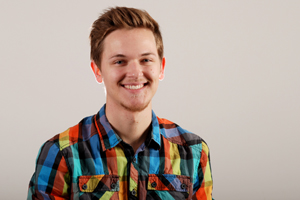Opinion: Foreword to this forum
January 12, 2012
Andrew Paulsen
Andrew Paulsen is an electronic media production major and columnist for the Daily Kent Stater. Contact Andrew Paulsen at [email protected].
Congratulations! Presumably, you survived the first week back at Kent State, so it’s time to head out tonight and celebrate.
I’m kidding — don’t act like you needed an excuse from me to party on a Thursday night.
This week does hold certain significance to myself, though, because it is the first week of my final semester of undergraduate education (small victories, my friend).
In less than four months, I’ll be walking down the aisle, decked out in cap and gown to accept my diploma and give a big ole bear hug to President Lefton.
It’s nice to daydream about that now, but I’ll be realistic here — these next four months are not going to be easy.
I’m taking seven classes, working at the campus TV station and writing this column each week. On top of that, I need to balance time between hanging out with friends, applying for jobs and catching up on news.
That last item might seem like the least of my worries, but it’s pretty important this year.
Between the movie and TV buzz I keep up on for my career’s sake, and updates from the Presidential campaign trail, staying current in the news is a big deal.
It’s particularly crucial when the election will indirectly decide how much (or how little) taxes and health care will affect my income from my first job (or, worst-case scenario, my first unemployment check).
I really have to analyze history, and present reality and truth in order to make informed political decisions.
I found it very fitting that after I picked this article’s topic, two of my professors emphasized the importance of critical thinking in Monday’s lectures. First, my Political Thought professor, Richard Stanislaw, posed the question “When do you break the law?”
While this question would serve as a great prompt for a future column, I’ll stray away from that topic and focus instead on what I interpreted as Mr. Stanislaw’s intention.
You see, my classmates all had their ideas on morality and ethics and shared them with the class, but after each viewpoint was offered, Stanislaw shot down their answer by presenting the negatives of their philosophy.
Despite his apparent amusement at students’ frustration with his alternative reasoning, this wasn’t his opportunity to make us feel stupid. Rather, it was a chance to promote thoughtful discussion in class (I’ll find out on Monday if I was correct).
In my Reviewing Film and TV class, instructor Mark Dawidziak told us that contrary to popular belief, the phrase “Everyone is entitled to their own opinion” is not true.
Besides bad grammar, as he pointed out that “their” should be replaced by “his or her,” Dawidziak said one word was missing from the phrase that would make any opinion valid otherwise:
Informed.
That is the key to critical thinking, and in turn, vital to civil discourse.
To paraphrase Dawidziak, the more we know, the less harm is done to all. So, to keep up with this idea of civil discourse and critical thinking, I encourage you to tweet (@AJPaulsen) or email me ([email protected]) your informed thoughts about this article today and every Thursday column for the remainder of the semester.
While I’m no Ann Landers, Miss Manners or Dr. Phil, I’ll try to address your questions or comments in future editions so that we can all benefit from a public forum of concerns and ideas.

























